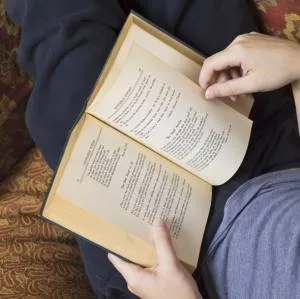
When I was in high school, like many angst-ridden, Plath-reading young women, I wrote poetry. Bad poetry, to be sure, but poetry. Writing fiction never crossed my mind, let alone nonfiction (and yet I ended up in nonfiction writing anyway). Along with Plath, I read Sexton and Dickinson. To this day, Dickinson’s “My Life Closed Twice Before Its Close” randomly pops into my head; once, it even showed up in a dream. But some time in college, I stopped writing poetry. I stopped reading it for a while — too long, if I admit. In fact, it’s only been in recent years that I’ve started getting into it again, perhaps because I had a very narrow idea of poetry.
Now, my poetry includes Eileen Myles, Rachel Zucker, Maggie Nelson, Allen Ginsberg, and Cate Marvin. Prose poetry is a weakness of mine, as is poetry that breaks traditional form. (Don’t even start with “confessional” poetry; I find the “confessional” label a bit sexist and, to be honest, useless.) Zucker, along with Arielle Greenberg, wrote an entire book — a poemic, as the subtitle says —
Home/Birth. I will freely admit that I don’t always “get” where these poets are going. Sometimes I read a poem and know that it’s one I need to read over and over and over in order to fully appreciate the craft that went into it. And sometimes, while I am in awe of the work on the page before me, I have to admit that I’m just not getting it. But I have learned, over the years, to give myself over to the language, to let their words wash over me, and take what appears at the end. I often rush things — in life, in writing — and poetry forces me to slow down and stay in the moment. To go
through the moment, instead of around it. Nelson wrote a whole book on blue; she
stayed there. Too often I tear through books; I can’t tear through a poetry book. The poems demand that I stay with them, turn the words over and over in my head, hear their sounds, and then move on to the next page. Poetry places demands on my time, forces me to really look at what the writer is saying.
I’m not a very good reader of poetry yet. I couldn’t tell you the first thing about the craft of poetry, stanzas, or technique — but that’s what keeps drawing me back to it; the fact that there is so much more to learn.
Is there a genre that challenges you? How’d you get into it?
____________________
Want more bookish goodness, news, posts about special book deals, and the occasional puppy reading pic? Follow us on
Facebook:


 When I was in high school, like many angst-ridden, Plath-reading young women, I wrote poetry. Bad poetry, to be sure, but poetry. Writing fiction never crossed my mind, let alone nonfiction (and yet I ended up in nonfiction writing anyway). Along with Plath, I read Sexton and Dickinson. To this day, Dickinson’s “My Life Closed Twice Before Its Close” randomly pops into my head; once, it even showed up in a dream. But some time in college, I stopped writing poetry. I stopped reading it for a while — too long, if I admit. In fact, it’s only been in recent years that I’ve started getting into it again, perhaps because I had a very narrow idea of poetry.
Now, my poetry includes Eileen Myles, Rachel Zucker, Maggie Nelson, Allen Ginsberg, and Cate Marvin. Prose poetry is a weakness of mine, as is poetry that breaks traditional form. (Don’t even start with “confessional” poetry; I find the “confessional” label a bit sexist and, to be honest, useless.) Zucker, along with Arielle Greenberg, wrote an entire book — a poemic, as the subtitle says — Home/Birth. I will freely admit that I don’t always “get” where these poets are going. Sometimes I read a poem and know that it’s one I need to read over and over and over in order to fully appreciate the craft that went into it. And sometimes, while I am in awe of the work on the page before me, I have to admit that I’m just not getting it. But I have learned, over the years, to give myself over to the language, to let their words wash over me, and take what appears at the end. I often rush things — in life, in writing — and poetry forces me to slow down and stay in the moment. To go through the moment, instead of around it. Nelson wrote a whole book on blue; she stayed there. Too often I tear through books; I can’t tear through a poetry book. The poems demand that I stay with them, turn the words over and over in my head, hear their sounds, and then move on to the next page. Poetry places demands on my time, forces me to really look at what the writer is saying.
I’m not a very good reader of poetry yet. I couldn’t tell you the first thing about the craft of poetry, stanzas, or technique — but that’s what keeps drawing me back to it; the fact that there is so much more to learn.
Is there a genre that challenges you? How’d you get into it?
____________________
Want more bookish goodness, news, posts about special book deals, and the occasional puppy reading pic? Follow us on Facebook:
When I was in high school, like many angst-ridden, Plath-reading young women, I wrote poetry. Bad poetry, to be sure, but poetry. Writing fiction never crossed my mind, let alone nonfiction (and yet I ended up in nonfiction writing anyway). Along with Plath, I read Sexton and Dickinson. To this day, Dickinson’s “My Life Closed Twice Before Its Close” randomly pops into my head; once, it even showed up in a dream. But some time in college, I stopped writing poetry. I stopped reading it for a while — too long, if I admit. In fact, it’s only been in recent years that I’ve started getting into it again, perhaps because I had a very narrow idea of poetry.
Now, my poetry includes Eileen Myles, Rachel Zucker, Maggie Nelson, Allen Ginsberg, and Cate Marvin. Prose poetry is a weakness of mine, as is poetry that breaks traditional form. (Don’t even start with “confessional” poetry; I find the “confessional” label a bit sexist and, to be honest, useless.) Zucker, along with Arielle Greenberg, wrote an entire book — a poemic, as the subtitle says — Home/Birth. I will freely admit that I don’t always “get” where these poets are going. Sometimes I read a poem and know that it’s one I need to read over and over and over in order to fully appreciate the craft that went into it. And sometimes, while I am in awe of the work on the page before me, I have to admit that I’m just not getting it. But I have learned, over the years, to give myself over to the language, to let their words wash over me, and take what appears at the end. I often rush things — in life, in writing — and poetry forces me to slow down and stay in the moment. To go through the moment, instead of around it. Nelson wrote a whole book on blue; she stayed there. Too often I tear through books; I can’t tear through a poetry book. The poems demand that I stay with them, turn the words over and over in my head, hear their sounds, and then move on to the next page. Poetry places demands on my time, forces me to really look at what the writer is saying.
I’m not a very good reader of poetry yet. I couldn’t tell you the first thing about the craft of poetry, stanzas, or technique — but that’s what keeps drawing me back to it; the fact that there is so much more to learn.
Is there a genre that challenges you? How’d you get into it?
____________________
Want more bookish goodness, news, posts about special book deals, and the occasional puppy reading pic? Follow us on Facebook:






